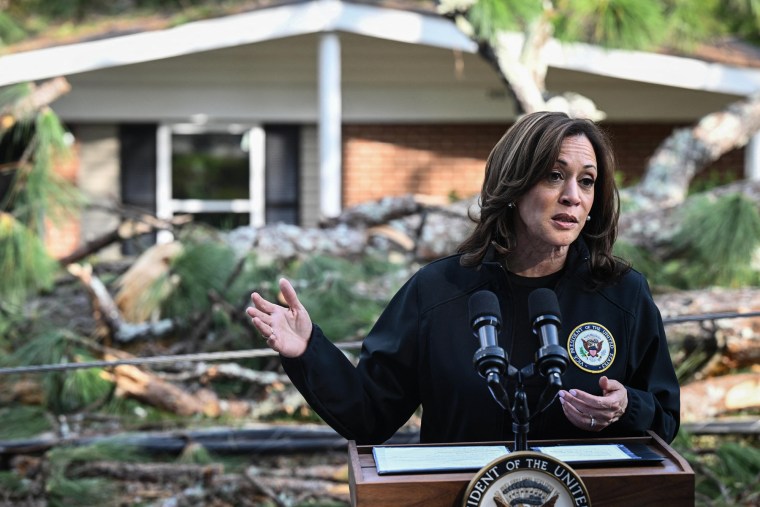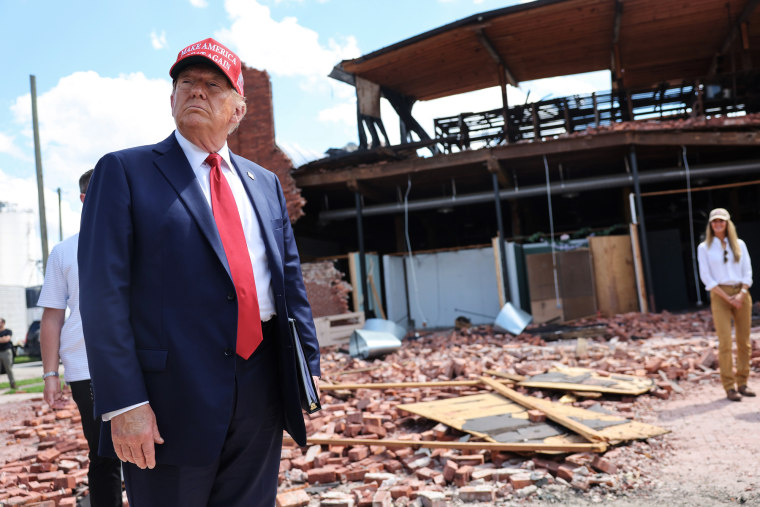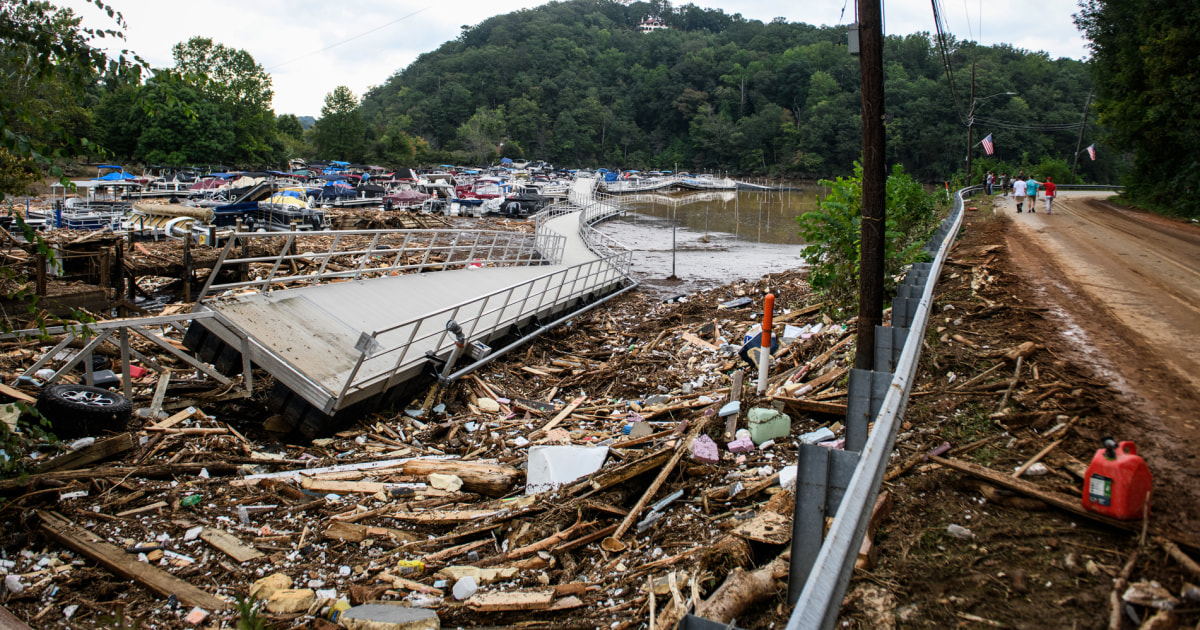The unprecedented destruction Hurricane Helene has wreaked on western North Carolina could take months, if not years, to rebuild. Entire communities are destroyed, and scores of residents are displaced. With the presidential election in less than 26 days, both parties are scrambling to contend with the unpredictable political fallout.
For Vice President Kamala Harris, who became the Democratic nominee only 2½ months ago, the hurricane’s aftermath had meant the suspension of campaign rallies. That’s lost time when, in Harris’ world, every hour has counted, especially when the onus is on Democrats to flip a historically red state.
She will be back this weekend, though, hosting a political rally in Greenville — a part of the state not affected by the hurricane — for her first political event there since Helene hit 17 days before.
For former President Donald Trump, the devastation in deep red counties could hamper their voters’ ability to get to the polls. While state officials addressed voting issues this week, giving affected counties additional flexibility with early voting, there has been widespread pushback — from both Democrats and Republicans — to misinformation spread by some members of the GOP, including Trump himself.
And Republicans find themselves in an undeniably unusual position: In the final stretch of the race, they’re defending what was once a solid piece of the Republican map. Democrats have managed to win North Carolina only twice since 1964.
A tight, unpredictable race
Neither side sees data indicating the hurricane has fundamentally shaken the race. Instead, it is as tight as ever, members of both parties say. Only now, it’s also more unpredictable than ever.
“We are always playing like we’re one point down,” a Trump campaign official said. “The biggest thing for us is the momentum that we are seeing on the ground … is not an energy that we are seeing anywhere from the Kamala Harris team. I think that her energy, her momentum, has kind of fizzled off.”
However, Morgan Jackson, a longtime Democratic strategist in the state who has advised Gov. Roy Cooper and state Attorney General Josh Stein, said the exact opposite is true.
“We’re seeing incredible enthusiasm for Democrats. We’re seeing a little bit less enthusiasm from Republicans, and a lot of that continues to hold, and it’s based on the fact they don’t like their nominees,” Jackson said, referring to Trump and the embattled candidate for governor, Lt. Gov. Mark Robinson. “They don’t like … abortion-banning, social media conspiracy theorists and election deniers.”

The back-and-forth is playing out as North Carolina increasingly becomes central to both parties’ strategies to win the White House. Harris could significantly hamper Trump’s path if she wins the state, while Trump could block Harris if he keeps North Carolina and takes a blue-wall state like Pennsylvania. Unlike in previous presidential cycles, Democrats have a vast organization in the state, including 340 staff members, in addition to volunteers. It’s an operation that dwarfs Trump’s. Still, Republicans are betting the state remains reliably red.
There are signs, though, that a contingent of Republicans are ready to move on from Trump. In March, more than 250,000 people voted for Nikki Haley in the GOP primary in North Carolina even though she had already dropped out. In 2020, Trump won the state by about 75,000 votes.
Trump has railed against the Federal Emergency Management Agency’s response to Hurricane Helene, saying it didn’t move quickly enough to aid people in rural areas. But his remarks shifted into conspiracy theories and misinformation. They included charging without evidence that the federal government was purposely refusing to provide aid to Republicans affected by Helene and that FEMA was out of money because of spending on illegal immigrants.
He was also contradicted by members of his own party, including Sen. Thom Tillis of North Carolina, who had praised relief efforts and panned those taking part in “political posturing, finger-pointing or conspiracy theories” in remarks widely viewed as critical of Trump’s assertions. After Harris posted Tillis’ statement on social media, however, he responded that he was actually talking about her.
“Republicans are going to do everything they can to make this about a botched response,” said Thomas Mills, a veteran Democratic North Carolina strategist. “So far, it isn’t working.”
Jackson argued that those affected could see Trump was trying to politicize the hurricane.
“When people are focused on safety and shelter and you’re focused on politics for your personal gain, that’s a problem,” Jackson said. “That’s an electoral problem for candidates who push these narratives, these fake narratives.”
Jonathan Felts, a longtime Republican strategist in North Carolina who is working on a super PAC backing Robinson, said Trump has solid support in rural parts of the state. He added that it would be wise for Republicans to make a greater get-out-the-vote and early voting push in the region to ensure residents still turn out after the disaster.
Harris “still has zero message for rural North Carolina, and the storm didn’t change that,” he said.
A Trump campaign official pointed to efforts to expand the Trump tent with surrogates like Robert F. Kennedy Jr., Tulsi Gabbard and Iowa Gov. Kim Reynolds to make gains among GOP voters who defected to Haley. Trump’s vice presidential running mate, Sen. JD Vance of Ohio, was in the state Wednesday. This person made it clear that the effort to expand the coalition was aimed at “historically Democrat Blue Dog voters.”
Harris’ political operation has still been churning even when she isn’t in the state, including a coming visit by former President Bill Clinton. On Thursday, the campaign held a watch party for a Univision town hall event with Latino voters in Raleigh. In separate events, Kentucky Gov. Andy Beshear is set to visit Friday, as are officers who worked defending the U.S. Capitol during the Jan. 6, 2021, attack.
Helping residents recover — and vote
The Trump campaign believes the recent legislation passed by the North Carolina Legislature will go a long way toward solving voting issues it was concerned about in the western part of the state. But it’s ready to take additional steps.
“If we have to get volunteers out there to cut down trees, we’ll get volunteers out there to cut down trees and make sure they get out of the driveway to go vote,” a campaign official said. “We’re working through what it’s going to look like to make sure that we’ve got canned food drives, barbecues at these early vote centers to make sure that our voters can come out to get something to eat and then, while they’re doing that, make sure they’re casting their ballots.”

Trump had set up a GoFundMe page to benefit victims of the storm across several states, including North Carolina, Georgia, Florida and Tennessee. It has so far raised more than $7.6 million. Trump’s campaign didn’t say whether he personally donated.
Harris’ organization, well-funded and expansive, is far ahead on that measure in North Carolina. For weeks, it has hauled tractor-trailer trucks of water to western North Carolina, delivered supplies and shuttled toiletries, batteries and shelf-stable food from nearby states to the hardest-affected areas, including drop-offs at community and distribution centers. The Harris campaign also hosted community meals that fed 120 families, and it is organizing similar events, spending more than $30,000 on relief efforts. It also set up a voter assistance hotline that it says has hundreds of live operators ready to help voters by phone or text.
“Our hearts are with the North Carolinians impacted by Hurricane Helene and we are working closely with our legal and voter protection teams and the N.C. Democratic Party to ensure that every eligible voter is able to safely make their voices heard in this election,” Dory MacMillan, the North Carolina-based spokesperson for the Harris campaign, said in a statement.
The Trump campaign hit back at the notion that voters there were recoiling at the hurricane misinformation he and his allies had promoted online, saying he showed up in a hurricane-ravaged part of Georgia before Harris or President Joe Biden visited. Biden and Harris didn’t want to get in the way of state and local officials who were working to reconnect the affected communities where roads and other services had been cut off, Biden said at the time. Ultimately, after Biden toured North Carolina, Harris visited once in her official capacity after she visited Georgia to underscore relief efforts. Trump visited North Carolina once, holding a town hall.
“He’s been talking about how FEMA has misused dollars,” the second Trump official said, charging that the administration had misused emergency dollars, which Biden’s team has repeatedly rebutted.
Zeb Smathers, the mayor of Canton, North Carolina, which faces a significant recovery after the storm, said the hardest-hit residents have no bandwidth for politics and could strike back at anyone who is viewed as using the hurricane for political gain.
“There’s a time for politics, but I think the American people, the ones that lost so much, deserve to have their leaders put politics aside and lead,” Smathers said, adding that ultimately that is what happened in places like his town. “We’ve been able to work together, get so many resources for our people, and the American people need to see that. Let that be one of our legacies of all of these crises.”

Leave a Reply